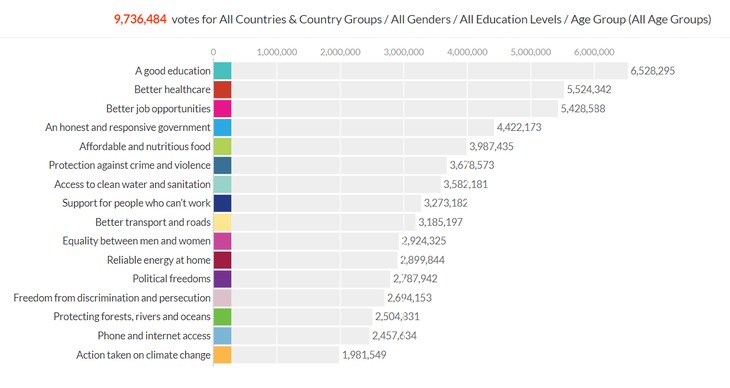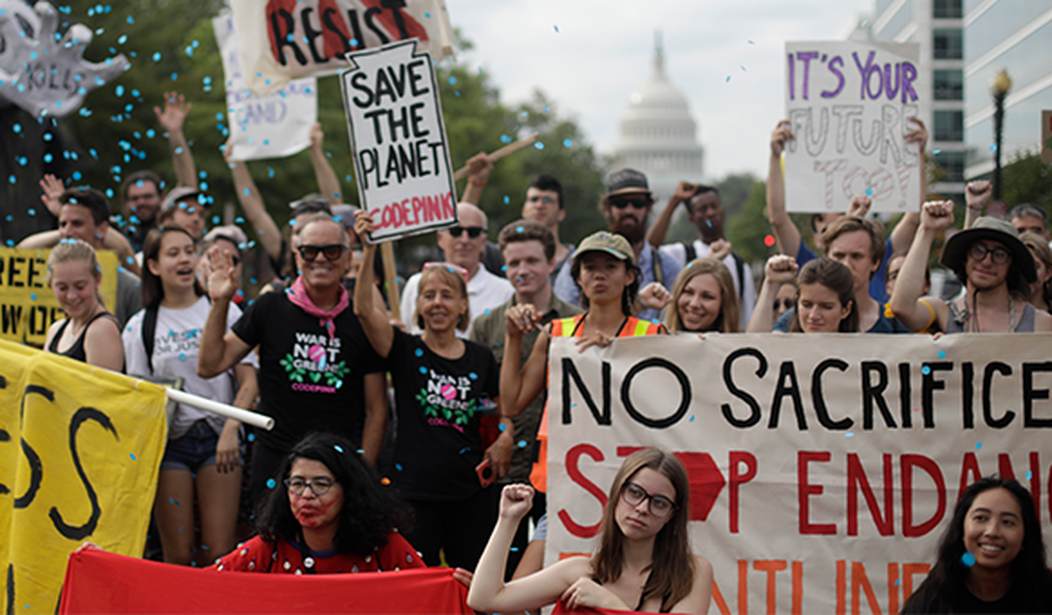Environmentalism is being disgraced because of its extreme focus on one discredited cause above all others. Left uncorrected, this fixation threatens to reverse the important progress that has been made in many areas—pollution control, species at risk, and environmental justice, for example. It is also revealing the movement to be fundamentally immoral, one more concerned about political correctness and profits for multinational “green energy” corporations than the plight of the world’s poor.
The cause in question is the nonsensical belief that we can stop dangerous climate change from occurring by reducing our greenhouse gas emissions.
To get a feel for how dominant climate change has become, overwhelming all other environmental concerns, consider World Environment Day, which happened this year on Sunday, June 5. Conducting a Google search for “World Environment Day” and “climate change” yields 730,000 results. Searching for “World Environment Day” and “air pollution” gives you 255,000 results, about a third as many. Doing the same but with “ocean pollution” yields only 37,700 results; “land pollution,” 17,400 results; “Species at risk,” 14,200.
The climate change emphasis of this year’s Earth Day, which took place on April 22, was even more pronounced, as seen in the following pie chart.

On Earth Day, “climate” appeared 10 times on the earthday.org home page. The United Nations International Mother Earth Day home page cited “climate” no less than seven times. Pollution was referenced once. Land once. Water and air not at all. Even Earth Day’s Google home page doodle took you to a page that showed the supposed impact of climate change.
The same is true of Earth Hour (March 28 this year) and Earth Month (April). Climate change now completely dominates environmentalism.
This has been going on for many years. Instead of concentrating on issues affecting people right now, the environmental movement has been hijacked by long-term concerns about climate change no matter what else is happening in the world. For example, two years ago, UN Climate Chief Patricia Espinosa “urged the international community to remain focused on Earth Day 2020’s overarching theme of climate change, despite the COVID-19 crisis…” The Earth Day 2020 website went further and called climate change “the biggest challenge to the future of humanity and the life-support systems that make our world habitable.”
Most people across the world apparently disagree. For the almost 10 million people who voted in the UN’s “My World” poll that was on the web between 2013 and 2020, “Action on climate change” ranked dead last (see figure below), despite the agency listing that priority first among issues to be selected from.

A new UN poll asks the public to tell them: “WHICH SIX OF THE FOLLOWING GLOBAL GOALS ARE OF IMMEDIATE CONCERN TO YOU AND YOUR FAMILY?” So far, 582,426 people have voted and “Climate Action” is currently ranked 9th out of the 17 goals, securing about one-tenth of the votes cast.
When their opinion polls showed relatively low concern about environmental issues in their 2015 survey, Gallup proposed several causes of the decline, one of which should seriously concern the environmental movement’s strategists: they are, in effect, focused on the wrong issue.
Gallup explained, “The primary focus of the environmental movement has shifted toward long-term threats like global warming — issues about which Americans tend to worry less than about more immediate threats like pollution. Importantly, even as global warming has received greater attention as an environmental problem from politicians and the media in recent years, Americans’ worry about it is no higher now than when Gallup first asked about it in 1989.”
Most sensible people are environmentalists and want clean air, land, and water. Yet climate change has essentially hijacked the entire environmental movement, sucking funding and energies away from tackling important short- and mid-term issues such as pollution and species at risk. Besides the fatal strategic blunder of focusing on an issue the general public seems to not really care much about, there is a serious ethical problem that will eventually come back to haunt the movement.
Documents such as the Climate Change Reconsidered series of reports from the Nongovernmental International Panel on Climate Change illustrate that debate rages in the scientific community about the causes of climate change. Scientists cannot yet even agree on whether cooling or warming lies ahead, let alone how much we affect the climate. Yet global warming campaigners assert that “the science is settled.” We know for certain, they claim, that our carbon dioxide emissions will cause a planetary emergency unless we radically change our ways.
This makes no sense, of course. Uncertainty is inherent to all science, especially one as complicated as climate change.
The consequence of this overconfidence is tragic. According to the San Francisco-based Climate Policy Initiative, of the over one-half trillion dollars that is now spent annually across the world on climate finance, 91% goes exclusively to mitigation, trying to control future climate states. Only 7% of global climate finance is dedicated solely to helping vulnerable people cope with climate change in the present. This is occurring even though the UN originally wanted funding for mitigation and adaptation activities to be approximately equal.

The reason for this imbalance seems clear. Mitigation projects are generally more attractive to powerful players who often have motivations other than environmental protection or helping the poor: energy companies and carbon traders trying to maximize revenue, politicians wanting to increase taxes and control over their citizens, one-world government advocates, etc.
In contrast, the local scale of the “boots on the ground” approach needed for most adaptation initiatives do not so nearly fulfill the primary objectives of these groups.
The result is that, based on a flawed hypothesis about the causes of climate change, and influenced by powerful vested interests, we are letting people suffer today so as to possibly help those yet to be born.
As the public comes to understand this, they will soon regard the climate crusade as fundamentally immoral and today’s environmental movement as wholly misguided. That scenario, not theoretical future climate, is what should most concern sensible environmentalists.









Join the conversation as a VIP Member